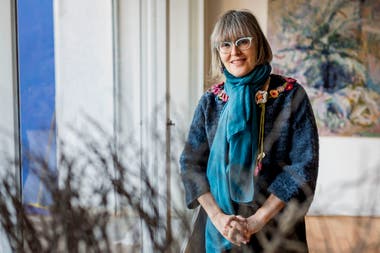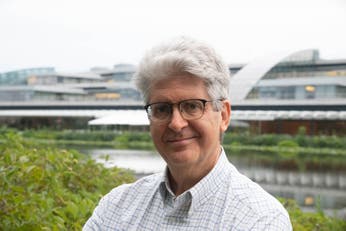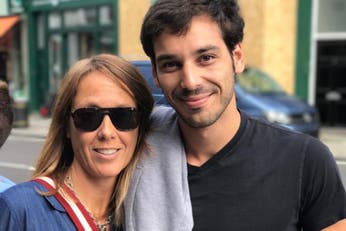This pandemic is not only changing the way of living, but also the way of dying and dismissing loved ones. In a unique context, unthinkable until just a few months ago, with face-to-face visits suspended and burials brought to their minimum expression,
the duel becomes much more difficult
. For the doctor Mariela Bertolino (56 years old), coordinator of the Palliative Care Unit of the Tornú Hospital-Femeba Foundation and recognized leader in the subject, the challenges that arise in the framework of COVID-19 are multiple: from rethinking the role of health teams – in some cases, the only intermediaries between terminally ill patients and their families – until they look for other forms of affective approach and
new rituals
that replace the traditional ones.
-What are the challenges facing us in the current context when it comes to going through a duel?
-At this moment, when we think about the death of a loved one, either due to the COVID-19 disease or others, a particularly painful situation arises, since due to issues of epidemiological and legal protection, traditional approach ceremonies are prevented. This can generate an impact to which we must be extremely vigilant, because added to the pain of the loss, the alteration of the process of dismissal and the beginning of grief work can cause consequences that affect the emotional health of many people. If the appropriate measures are not taken, in the coming months it could happen that there are a large number of complicated mourning processes, that require professional attention and that have the expression of extremely high suffering for those who are ill and their families. We have to prepare the system to give place to the support and accompaniment of duels in complex situations.
-What suggestions do you give to make these duels a healthy process?
-Traversing the loss of a loved one in these circumstances and starting the period of mourning confronts us to find new rituals or ceremonies that allow us both contact with the memory of the deceased person, and recognize their absence. These kinds of actions are essential. At a time when some ceremonies such as funerals or family gatherings or emotionally close people cannot be done in the post-death periods, there are many professionals in the area of psychological and spirituality who recommend, first, to be able to speak about these issues in family, both among those who are living together, and with those who are at a distance.
-Putting the subject on the table is essential.
-Yes, you have to talk about pain, how each one is handling it, about the emotions they feel. It is very important to integrate children, the elderly and, eventually, if there are members with a disability or illness. One recommendation is that they are not excluded to protect them because we all perceive, regardless of our age and our cognitive conditions, the emotional intensity of the family and realize a loss. You have to integrate them and adapt the dialogues to know how they are, what is happening to them, what they need to know, what they imagine. Those are the doors to begin to go through this process of pain in the affective community in a healthy way.
-People are irreplaceable, but rites are not. How can farewells adapt to the times we live in?
-There are small ceremonies or rituals that can be done when one cannot approach a loved one who is hospitalized or died. To promote or give ideas, it is first important to always ask family or loved ones which are meaningful to them, so that they are not imposed or artificial proposals. But there are some reminder activities such as looking for photos, creating a corner where one can put something that reminds us of our loved one and we can get closer at a time of day and have a personal experience, light a candle with the children or write on paper what we feel or could not say, something that for children and adults usually has a giant value. In the case of the particular moment of death, when that reunion between family and friends is not possible, there are people who are putting together WhatsApp groups to give the news and where each one can put something that is significant in relation to that person who died . There are those who will value it a lot and others who may go through the processes a little more intimately. All forms are respectable.
-There are no formulas and each case is unique.
-Of course. The important thing is that each one identifies what are the actions or things that help him and that he does them according to his beliefs and not by impositions. There is a family that recently lost a husband and dad to very young girls who had a huge group of friends. One of the pains of this family was knowing that at the time of the farewell all those affections could not be. They had never imagined that this situation would happen to them: it was already painful in itself to prepare for the absence and this increased their pain. Sometimes one wonders if in these circumstances a second ritual can be planned, as there is, for example, in the Jewish culture, where a ceremony is performed again a year after death. I think it is important that people who need it can take into account that possibility, that of doing a ritual later.

-Currently, in Argentina, when a person is hospitalized by COVID-19, the access of their relatives to intensive care is prohibited. On the other hand, if it is any other type of disease, visits were very restricted. In this context, health professionals become essential intermediaries. How do their roles change?
-Health professionals have a privileged role. In all cases, it is essential to know the person, identify their needs, their references with whom they would like to communicate, and try to make video calls or daily calls by telephone or technological means. In cases where there is no availability of a phone or device by the inmate, many health professionals are bringing their own so that no one is emotionally isolated. The same value as a medicine has effective listening and communication, accompaniment and family approach. And if that is not possible, perhaps we have the opportunity to make that link and be like the representative of that family that cannot be. We must not only facilitate interaction between them, but assure the patient that we contact and contain the family, and the family that we can contact and contain the patient. This also serves to identify situations of greater emotional intensity that require the therapeutic accompaniment of a psychologist, social worker or people who work in spiritual support. We are seeing a lot of articulation networks that are providing themselves to work on this task and that is highly positive.
-Protective masks and mandatory distancing are measures that also pose new forms of relationship in the interaction between doctors and sick people.
-We are learning to communicate in this way as well. It is impressive how quickly at first we felt communication barriers and now, somehow, we managed to make the expression of the eyes more felt, that the voice has, even behind the chinstrap, a tone that allows us to communicate; and, above all, what is always valued is listening to sick people: that is the most important thing, not so much to speak about us but rather that they say what they need and what they do them good. Technology has a key role. In the hospital where I work, the Tornú, we had situations where naturally, in another context, the children of the family are always welcome at any time, but now this cannot be done. What we are offering is the possibility for us and the parents to talk, to get to know each other through video calls with the children and, if they want, to accompany them on a visit of their loved one to the unit by taking the phone. We have made some calls that have been of unsuspected value and we think that this is a step to facilitate this affective approach mediated by technology, obviously, but our hope is that this will serve more than impossibility or deep isolation.
-However, you who have accompanied those who are going through their last days and their relatives for almost three decades, know that physical presence is irreplaceable. What can be done to ensure that this closeness exists in cases of coronavirus sufferers?
-Both in Spain and in the United States, in some contexts, particularly inpatient care, they are beginning to allow the visit of a family member at a time when the person is seriously ill. What a team of nurses from a Seattle hospital did was create a device where the family member is accompanied to visit the patient in intensive care, with all the necessary equipment, and in addition to supporting him, care is taken that all the protective measures are respected. . In this way, at least one face-to-face contact was provided, which is extremely valuable. They have done the same in clinics in Spain. This is something very interesting and, for now, in Argentina it is not being allowed. It is something to consider and see with epidemiologists and the different people in charge as the pandemic evolves. If one takes the appropriate protection measures and care and there is accompaniment from the medical team, I believe that a person who is about to die can be allowed to be with his loved ones. Even if it is a distance of a meter and a half, but they are there.
Mariela Bertolino is vice president of the Icalma Foundation for Comprehensive Care, deputy coordinator of the Argentine Palliative Care Program at the National Cancer Institute, a pre and post-graduate professor of palliative care at Austral University, FLACSO, Universidad Católica Argentina and Fundación Femeba Virtual Institute.
ALSO
.
Publicado en el diario La Nación




